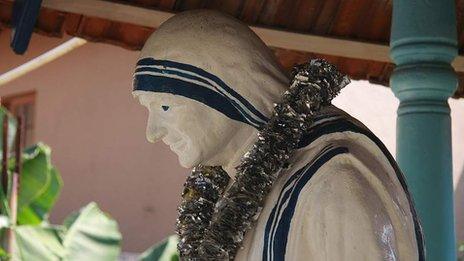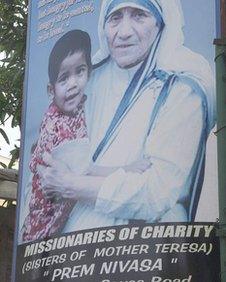Mother Teresa Sri Lanka order rocked by baby charges
- Published

The statue of Mother Teresa at Prem Nivasa normally presides over a quiet and tranquil nunnery
The Sri Lankan mission of the famous order of nuns founded by Mother Teresa of Calcutta is in crisis. The order's overall head has visited the island and held urgent talks with the Archbishop of Colombo, as one of its eight residences in the country faces accusations of irregularities in its home for pregnant mothers and children, irregularities the church strenuously denies. The BBC's Charles Haviland reports from Moratuwa.
At the Prem Nivasa (House of Love) convent in the town of Moratuwa south of Colombo stands a white and blue statue of Mother Teresa, founder of the Missionaries of Charity to which the nuns belong.
There is also a small playground: the convent is home to 31 children and babies, and to mothers and mothers-to-be.
The sisters welcome the BBC but do not want to talk about their current situation.
But the head of the convent, Sister Mary Eliza, is not here. She is currently compelled to stay elsewhere.
On Thursday a magistrate's court will consider reports from the probation and child protection authorities which may lead to a legal case against the religious order.
It comes after a raid on Prem Nivasa last month organised by the National Child Protection Authority (NCPA), also involving the Criminal Investigation Department.
'Rubbish' allegations
The sister, who is an Indian citizen, is out on bail after three days in a high-security jail - the first time a member of Mother Teresa's order has been imprisoned since it was established in 1947.
The authorities say there are suspicions that the sisters harboured girls who had become pregnant aged under 16 - the age of consent - and also that money may have corruptly changed hands for the adoption of babies.
The Roman Catholic church denies wrongdoing. Lawyers for the sisters say there was no intentional offence.
Not far from the convent I meet Father Cyril Gamini at St Joseph's Church.
As we sit on wicker chairs in his porch Father Cyril, episcopal vicar of the southern region of the Archdiocese of Colombo, admits that the convent has sheltered a few girls who were pregnant under-age; but, he says, there has been no crime worthy of arrest.
The girl at the centre of the current allegations was brought to Prem Nivasa by her mother, he says.
"In our culture if a girl this age gets pregnant she just cannot face society. Her mother feared that if this came out there would be a lot of problems among her relatives. She asked the sisters not to tell anyone.
"We as priests and they as nuns - we are bound by charity and love, that's how we work."
The priest also rejects as "rubbish" the accusation that the nuns may have taken money to give children for adoption.
He says the probation department closely monitors adoptions from Prem Nivasa and that everything is done through the courts with strict adherence to the law - whether the adoption takes place locally or abroad.
Complaint
Hiranthi Wijemanne, a former chairperson of the NCPA, says however that the raid on the nunnery took place because of a tip-off from somebody who has not been publicly named.

The Missionaries of Charity are now the subject of a criminal inquiry
"It's the NCPA's role to monitor such institutions. In this case there was a complaint regarding a money transaction related to foreign adoptions," she told the BBC.
As for the accusation that the convent sheltered pregnant girls, she acknowledges that there is shame attached to people in such a situation and that providing secrecy to them can help avoid stigma.
"But there's a mandatory requirement to report it," she adds, explaining that someone causing an under-age pregnancy is guilty of statutory rape in Sri Lankan law.
Senior church officials are not happy. Cardinal Malcolm Ranjith, Archbishop of Colombo, told a news conference that the only money paid in connection with adoptions from Prem Nivasa was paid by adoptive parents for court fees or a child's upbringing.
He criticised some of the more lurid media reports arising from the case and defended the convent's role as a refuge.
As a protest against the handling of the affair he announced a temporary boycott of state functions.
President Mahinda Rajapaksa's wife is a prominent Catholic and the government itself has been sounding a conciliatory note.
The main government spokesman says that the minister of child development has already apologised for any possible mistakes in the handling of the case.
The Indian high commission will say only that it is monitoring this case regarding its citizen and giving consular officials access to her.
Meanwhile the Missionaries of Charity sisters are spending much time in prayer, and say they want to continue their ministry to the poor.
- Published29 November 2011